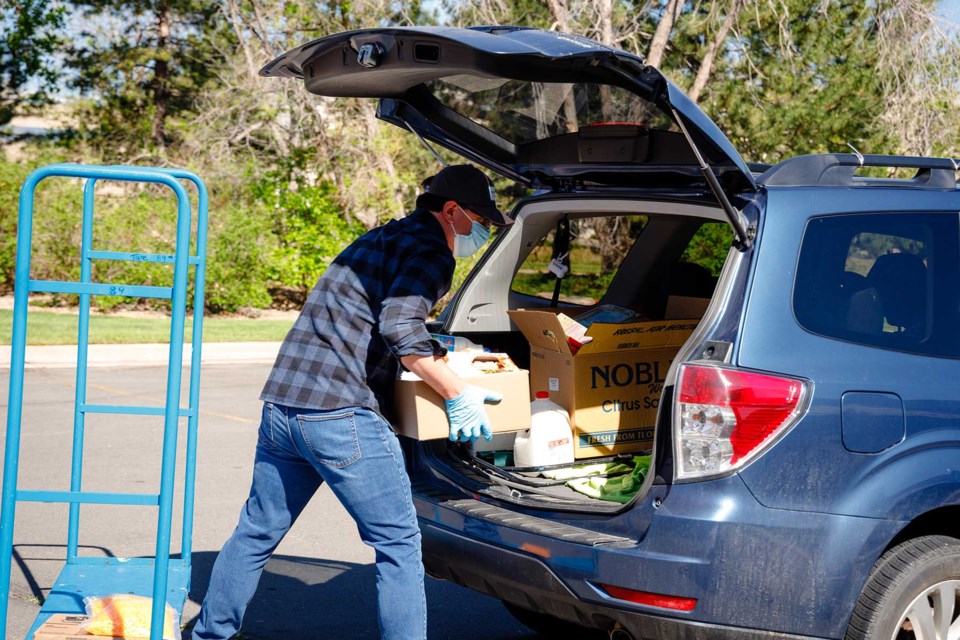Organized nearly 40 years ago, Community Food Share began from an identified need throughout Boulder and Broomfield counties.
Those needs are greater than ever right now and the organization has launched a new program to put fresh fruits and vegetables on the table for residents.
Julia McGee, Community Food Share director of communications, said the organization has distributed over 1 million pounds of food each month since the onset of the coronavirus pandemic in March.
Prior to the pandemic nearly 40,000 people a year relied on the food bank and its network of food pantries, according to the website. But that number is likely to keep climbing: It is estimated demand will grow by 35% in the months to come at the food bank that distributes nearly 10 million pounds of food a year, according to McGee.
The need for food in the community has spurred the organization to create a pop-up produce drive-thu program “specifically in response to the pandemic,” McGee said.
The program is funded through the U.S. Department of Agriculture Coronavirus Food Assistance Program, which enables the USDA to purchase “fresh produce, dairy and meat and then work with distributors, wholesalers and farmers to provide boxes of those products to food banks and other community organizations,” McGee said.
The program not only provides food to food banks but also supports food producers who were losing a lot of business during the pandemic, McGee said.
“It is a significant influx of produce for our food bank and so we wanted to find an avenue that could help us move it quickly and to as many people as we could reach,” she said.
The influx was too much for the organization to distribute through its traditional means so it created the pop-up drive-thru program to reach more people in need.
Additionally this program offers Community Food Share the opportunity to expand its distribution to the weekend, as pop-ups are held primarily on Saturdays.
The produce is prepackaged in boxes when received by Community Food Share to reduce the amount of handling. Each box weighs about 20 pounds and includes a mixt of products, said McGee.
Those in need of fresh produce can find the pop-up drive-thru on Saturday and Aug. 15 in the parking lot of Sunset Middle School, 1300 S. Sunset St. There are no eligibility requirements, McGee said. The event begins at 9 a.m. and continues until all of the boxes have been distributed.
Those picking up produce are asked to stay in their vehicles and to have an empty trunk “to have an easy and safe loading experience,” McGee said. Walk-up participants are welcome and are encouraged to observe social distancing and wear face coverings.
“One of the things that we pride ourselves on at Community Food Share is our commitment to nutrition. We ensure that at least 75% of the food that we put out into the community is fresh produce or high protein items,” McGee said.
Community Food Share is not the only local organization helping those in need of food. Longmont Food Rescue gathers food from local grocers and food businesses and delivers it to feed hungry, homeless and low-income populations, according to the website.
Longmont Food Rescue holds a monthly Produce in the Park program to allow participants to “shop” for free with no questions asked, according to the site.
Since the start of COVID-19 the organization has seen “a huge increase in food going out faster than before,” Executive Director Naomi Curland said.
In response, monthly produce distributions turned into bi-monthly Saturday events and moved to drive-up service at Westview Presbyterian Church, which also distributes food two Tuesdays a month.
The next produce distribution for Longmont Food Rescue will be at noon July 26 in the Westview Presbyterian parking lot, 1500 Hover St. Participants are asked to remain in their vehicles or on their bicycles in the designated line. Volunteers will bring food to them with no questions asked or forms to fill out, Curland said.
“It is certainly motivating … there is a feeling about the importance of our work and how we are feeding families in dire need. it's just a huge opportunity to help people in need,” she said.
The program helps an average of 50 families per event and receives free food from Whole Foods Market. Each vehicle receives two bags of produce and prepared food each visit according to Curland.
Both organizations partner with other programs to support those at risk of going hungry. Community Food Share partners with 40 other organizations to distribute food.
“One of the biggest lasting benefits is that in this crisis we are seeing an increase in collaboration with our partner organizations, it's a big coming together of different groups to make things more efficient so we can reach more people,” Longmont Food Rescue’s Curland said.
She said she hopes the coronavirus pandemic will open up broader conversations about food justice issues and spark discussions about removing barriers.
"We are all flying by the seat of our pants right now, temporarily suspending requirements we used to have (concerning income). A barrier to access is not just based on a low poverty standard. Sometimes just filling out a form is a barrier … there is a stigma about going to a food pantry,” she said. “Even though you are living paycheck to paycheck … that could be enough of a barrier.”
Both organizations are looking for help to continue their efforts. Learn more about how to help Community Food Share here, and about Longmont Food Rescue here.



